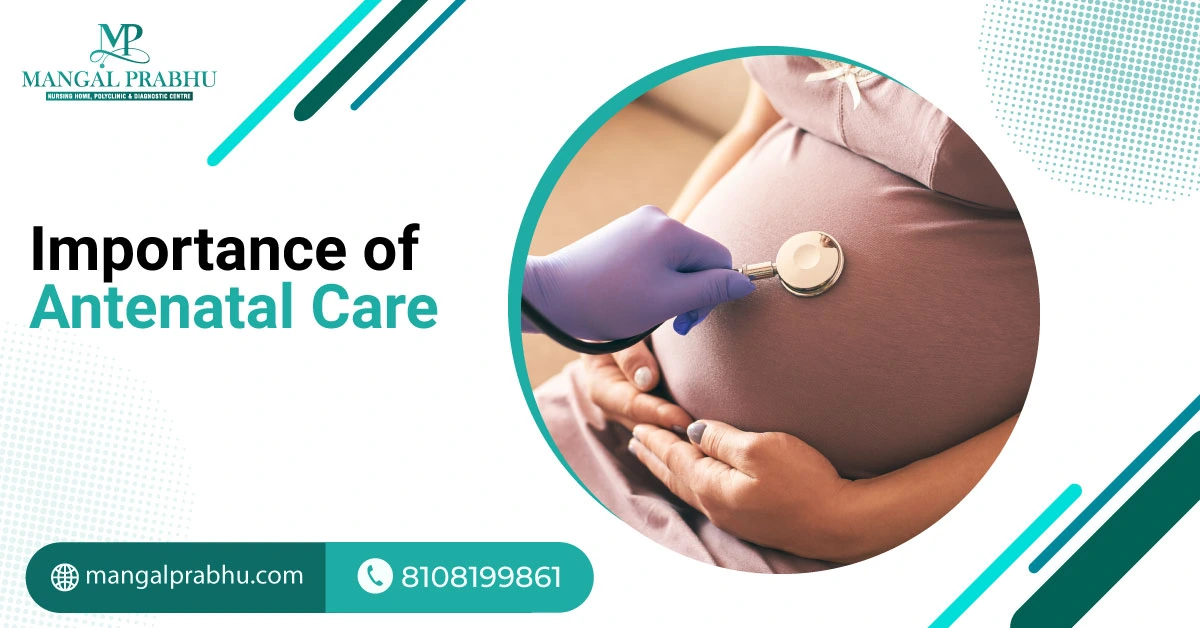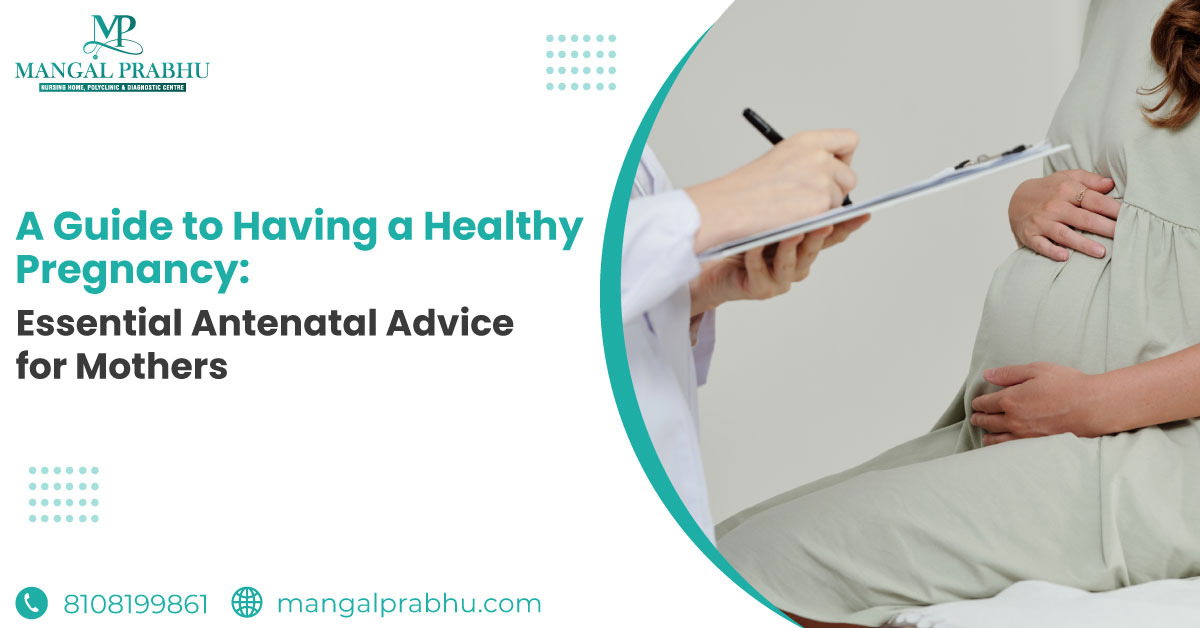
Importance of Antenatal Care
Pregnancy and childbirth are the toughest periods for women. Whether it’s your first pregnancy or the third, pregnancy symptoms and the fear of labor can be too overwhelming to handle. To help you cope with these challenges, a gynecologist in Navi Mumbai offers antenatal care.
It’s about ensuring a smooth pregnancy and an easy transition to the postpartum phase. The classes equip you with the knowledge and skills to handle pregnancy, labor, childbirth, breastfeeding, and your parenthood journey effectively. Here’s why antenatal care is important:
Benefits of Antenatal Care
Here’s why every woman needs to consider antenatal classes or an all-inclusive maternity care program:
a) Ensure Healthy Pregnancy:
Antenatal care is mostly about taking care of the mother and the fetus during pregnancy and in the initial stages of parenthood. Your gynecologist will run tests, like blood tests, urinalysis, and ultrasounds, to check your and the baby’s wellbeing.
b) Monitoring Fetal Development:
Regular fetal monitoring is part of your antenatal care program. The doctor will check the baby’s heartbeat, position, and overall growth using physical examination and ultrasound tests.
c) Early Detection of Health Issues:
Some women might develop hypertension, gestational diabetes, anemia, and other medical complications during pregnancy. Identifying and addressing these problems early can prevent complications during delivery.
d) Nutritional Guidance:
Your body demands a nutrient-rich diet, particularly foods rich in fiber, protein, essential vitamins and minerals, etc. Antenatal care ensures that you get sufficient amounts of these nutrients through your diet. If not, your doctor will prescribe calcium, iron, and other supplements to meet your body’s increasing demand for these nutrients.
e) Help Deal With High-Risk Pregnancies:
Women with high-risk pregnancies, such as those with diabetes, high blood pressure, thyroid issues, a history of miscarriage, and other medical conditions, require regular monitoring. Your doctor may also advise you to get an ultrasound every few weeks to ensure your baby’s optimal growth.
Components of Antenatal Care
Here’s what the antenatal care program includes:
i) Regular Checkups and Screenings:
You will need to schedule a visit to the maternity hospital in Navi Mumbai every month or more frequently depending on what your gynecologist advises. You also need to get regular screenings in the first, second, and third trimesters to track your baby’s growth.
ii) Educational Support:
Antenatal care allows you to ask your doctor all the questions you have regarding pregnancy, childbirth, breastfeeding, and postpartum care. Your doctor will prepare you for childbirth by discussing different delivery methods, their pros and cons, recovery after delivery, and so on. You will also learn breathing techniques.
iii) Immunizations and Supplements:
Tetanus shots during pregnancy are necessary for the protection of both you and your baby. For RhD-negative mothers expecting RhD-positive babies, an anti-D injection is given to prevent the formation of antibodies in the mother’s body.
Conclusion
Prenatal checkups are not just about hospital visits and screenings. These are an important part of your pregnancy journey. It’s a comprehensive program that covers everything from your nutrition to labor management techniques. Talk to your healthcare provider about the antenatal care offered and the services included.

A Guide to Having a Healthy Pregnancy: Essential Antenatal Advice for Mothers
The two positive lines on the pregnancy test are one of the best feelings for parents. As exciting as this phase is, pregnancy can bring a unique set of challenges. With everyone giving you different advice, it’s difficult to know who to follow. It’s important to see your obstetrician in Navi Mumbai immediately if your pregnancy test is positive. They will prescribe folic supplements (if you aren’t already taking them) and nutrition tips to keep the mother and the baby healthy. In the meantime, let’s see how you can prepare yourself for pregnancy.
Preconception Health: What You Need to Know Before You Get Pregnant
If you are planning a pregnancy, your healthcare provider will discuss your medical condition, any complications in previous pregnancies, any medication you are currently taking, and your family history of medical issues to rule out the possibility of any complications in conceiving. You should start 400mg of folic supplements right away.
You also need to stop the consumption of alcohol, drugs, and smoking to prevent the risk of pre-term birth, stillbirth, or miscarriage. Starting a healthy lifestyle with a balanced diet and regular exercising is key to maintaining a healthy weight for pregnancy.
Nutrition During Pregnancy
The calorie count for the day increases as your pregnancy progresses. Ideally, your body needs 300 extra calories daily to meet your baby’s growth requirement. You should get it from protein, vegetables, fruits, and other healthy foods. Cut down on sweets, junk food, and other unhealthy foods that offer little to no nutrition. Here’s what to include in your pregnancy diet:
- Green leafy vegetables and fruits
- Fat-free dairy items
- Foods rich in vitamins and omega-3 fatty acids, like fish
- Lamb, fish, beans, and other sources of protein
Also Read: What Is A High-risk Pregnancy?
Common Pregnancy Complications and How to Manage Them
Pregnancy complications can occur in any phase of your pregnancy. In the first trimester, there’s an increased risk of ectopic pregnancy or miscarriage due to genetic defects or a medical condition.
Later in your pregnancy, you should get screened for gestational diabetes and hypertension. Anemia is also a common problem in women during the second trimester. If you notice any unusual symptoms during pregnancy, reach out to your obstetrician immediately to prevent further complications.
Preparing for Labor and Delivery
A pregnancy care hospital in Navi Mumbai recommends you take antenatal classes to learn about labor and prepare your body for it as early as possible. Talk to your gynecologist about the exercises during pregnancy.
You will start with walking, swimming, and basic exercises in the first trimester. As your pregnancy progresses, your healthcare provider will recommend strength training and exercises that can help during labor.
Postpartum Care
The first few weeks after delivery are crucial for the mother’s health. With the responsibility of a newborn, the mothers sometimes forget they have delivered a baby. Your body needs rest and time to heal. Eat well and avoid heavy lifting, climbing stairs often, etc. Practice mild exercises, as recommended by your obstetrician, and keep the stressors away.
